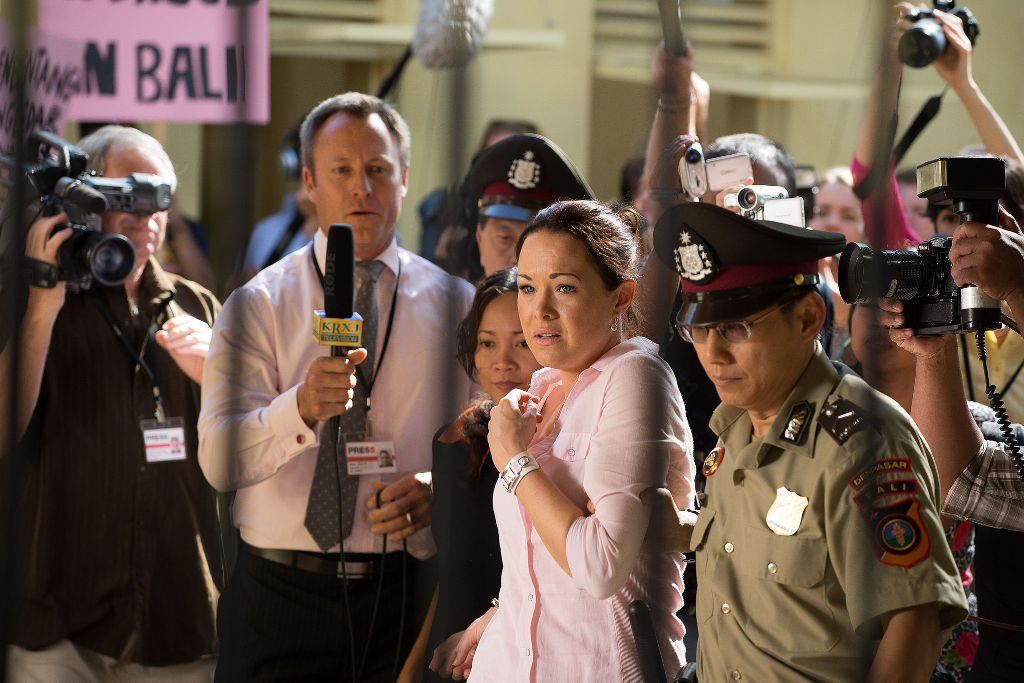The Schapelle Telemovie Represents Everything That’s Wrong With Australian TV
Having sat through all two hours of the Schapelle telemovie, we now know what it's like to be stuck in an Indonesian prison with a magical Jamaican sea witch.

As our commercial TV networks are well aware, the Australian public’s brains will implode if they’re forced to watch a television series that isn’t based on actual events. This is why it’s now almost illegal to produce something on Channels Seven, Nine and Ten that isn’t an Underbelly sequel or a Kerry Packer biopic starring Lachy Hulme.
With this in mind, it was only a matter of time before Our Schapelle©, Australia’s most beloved drug mule, was given her shot at the big time. Corby has never really been out of the spotlight, as such; since her arrest and trial she has been a perennial go-to for the Australian media, right up until her release this morning — which was timed almost impeccably with last night’s screening of Channel Nine’s telemovie, Schapelle.
At the height of the seemingly endless media coverage in 2005, polling indicated that nearly three quarters of the Australian public believed Corby was innocent of all charges. If Schapelle had been produced at any time between 2005 and 2010, it would have undoubtedly touted the A Current Affair- and Sixty Minutes-sanctioned image of an innocent abroad at the mercy of a group of scary foreign judges who “don’t even speak English.”
But times change. A Nielsen poll from 2010 showed that the number of people who believe in Corby’s innocence dropped to one in ten. Which means that any dramatisation of the events would necessarily have to deal in ambiguity, to reflect the general public’s changed opinion.
The book on which the telemovie was based, Fairfax journalist Eamonn Duff’s Sins of the Father, was sued for breach of copyright in 2011, and a number of homegrown pressure groups (including my personal favourite, Women For Schapelle) fought tooth and nail to stop the movie being shown. Sins of the Father accuses Corby’s father Michael of being the one responsible for stashing the 4.2kg of hash in Schapelle’s boogie board case, and the producers took this as their starting point for Schapelle — a point of contention amongst activists and “Corby Truthers”, who claim Nine “cruelly exploited the death of Schapelle Corby’s father to deliberately spin proven lies” to Australia, and who have repeatedly threatened and insulted Schapelle’s lead actress, Krew Boylan.
Originally scheduled for tonight, news of Schapelle’s parole hearing last week led Channel Nine to bring the film forward in their programming. Bypassing suggestions that it was fast-tracked to avoid an injunction against the broadcast, the network instead cited potential “Schapelle fatigue” as the main reason for the change — ignoring the fact that most Australians have suffered from that condition for several years. (This morning, Channel Nine announced they’ll be re-running the movie from 9.40pm tonight, after a one-hour news special on the case. Take that, fatigue!)
The new timeslot brought the movie into direct competition with the premiere of Channel Seven’s INXS mini-series, turning this into a ratings war between two very different types of nostalgia: the heady optimism of Never Tear Us Apart vs the moral ambiguity of Schapelle. For the record, INXS won.
So What To Make Of The Movie Itself?
We’re all so familiar with the story of Schapelle Corby’s arrest, trial and imprisonment that any dramatic retelling would need to show us another side to the story, one we hadn’t seen in the endless media runarounds of 2005. A genuinely stylish and well-thought-out movie could have given us new insight into the personalities of the people involved, and heralded a genuine turning point in the production of Australian television drama.
As it was, the first few moments of Schapelle, showing Malcolm McCauley (Russell Kiefel) preparing and sealing the infamous bag of marijuana, nearly looked impressive: mysterious, well-lit and nicely shot. It almost seemed like this would be something worth watching… and then it all came crashing down less than two minutes later, with shots of the beautiful, sunny Gold Coast to remind us all that this telemovie couldn’t have gone ahead without a $1.5 million cash injection from the Queensland government.
She doesn’t even take drugs. Everyone knows that Boogie Boarding is #Schapelle‘s drug.
— Steele Saunders (@SteeleSaunders) February 9, 2014
From then on, everything rolled out exactly like it had back in 2005, only this time it was handily compressed into two excruciating hours, with the fun addition of a mystical Jamaican cellmate for Schapelle — because Jamaicans love the ganja and Australians love racial stereotypes? — and an intrusive, vaguely ethnic sounding soundtrack to tell us whether we should be feeling SCARED FOR SCHAPELLE or SORRY FOR SCHAPELLE in any given scene.
Which was handy, because the actors sure weren’t giving us any clues. Colin Friels wandered around the set like a mumbly, homeless King Lear; Vince Colosimo looked like he was bored out of his mind; and while many reviewers have cited Krew Boylan’s performance as a high point of the movie, more than anything this just proves how low our expectations have dropped for Australian drama. She was able to look happy in one scene and sad in the next, and did a pretty good imitation of that ubiquitous verdict footage. This is not proof of an incredible talent. (The real stars of the film were Mercedes Corby’s Allen’s lolly teeth, who already have their own Twitter account.)
The main problem is that, for all its attempted humanisation of a polarising media figure and her family, Schapelle never quite managed to rise above the standard of a feature-length ACA dramatic reconstruction. Watching the movie unfold was like awkwardly waiting for an old man to finish telling a story you’ve heard a hundred times so you can take them to the toilet to get cleaned up. It highlighted everything that’s wrong with Australian commercial television: no new stories, no risk-taking, badly-written infodumps posing as dialogue, the same two or three actors who seem contractually obliged to appear in every Australian show, and a general sense that no one making this film actually gave a shit about creating a piece of work that served any purpose other than exploiting the media hype that has surrounded one woman for the last nine years.
I never thought I’d be on the side of a group of apparently unhinged conspiracy theorists, but in many ways I wish that Women For Schapelle and the other Corby Truthers had succeeded in their campaign to stop this movie being shown. The Australian viewing public deserve more than this. Even Schapelle deserved better.

–
Schapelle is being rebroadcast tonight on Nine from 9.40pm, following a one-hour news special.
–
Patrick Magee is a Sydney-based writer and comedian. You can read more of his stuff here, follow him on Twitter @paddy_magee, or buy his novel As Baile: A Story here.